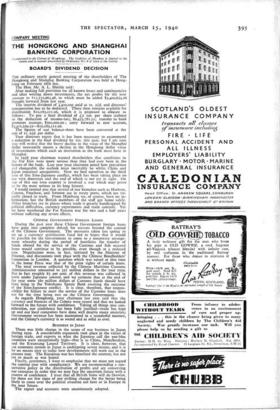COMPANY MEETING
THE HONGKONG AND SHANGHAI BANKING CORPORATION
iworporated in the Colony of Hongkong. The Liability of Members is limited to the extent and in manner prescribed by Ordinance No. 6 of 1929 of the Colony BOARD'S DIVIDEND DECISION THE ordinary yearly general meeting of the shareholders of The Hongkong and Shanghai Banking Corporation was held in Hong- kong on February 28th last.
The Hon. Mr. A. L. Shields said: After making full provision for all known losses and contingencies and after writing down investments, the net profits for the year amount to $13,353,965.48, to which must be added $3,400,634.26 brought forward from last year.
The interim dividend of £400,00o paid at is. 2.1d. and directors' remuneration has to be deducted. There then remains available for distribution $1o,165,111.o6, which it is proposed to allocate as follows: To pay a final dividend of £2 ios. per share (subject to the deduction of income-tax), $6,453,781.51; transfer to bank premises account, $300,000.00 ; carry forward to new account, $3,411,329.55—$10,165,111.06.
The figures of our balance-sheet have been converted at the rate of is. 2id. per dollar.
Your directors regret that it has been necessary to recommend a reduction in the final dividend by los. this year, but I am sure you will realise that the heavy decline in the value of the Shanghai dollar necessarily means a decline in the Hongkong dollar value of investments which such an institution as the bank must have in Shanghai.
In 1938 your chairman warned shareholders that conditions in the Far East were more serious than they had ever been in the history of the bank. Last year your chairman noted how precarious and changeable the outlook must inevitably be whilst China and Japan remained antagonistic. Now we find ourselves in the third year of this Sino-Japanese conflict, which has been taking place on our very doorsteps and the end of which is not yet in sight. On top of this our own country is involved a war which may prove to be the most serious in its long history.
I would remind you that several of our branches such as Hankow, Canton, Foochow, and Swatow are in treaty ports, which are vir- tually closed to trade. From Hamburg we, of course, have no in- formation; but the British members of the staff got home safely. Other branches are in places where trade is greatly handicapped by political difficulties, currency experiments and trade controls. Yet we have weathered the Far Eastern war for two and a half years without suffering any severe effects.
CHINESE GOVERNMENT FOREIGN LOANS
During the past year these Chinese Government foreign loans have gone into complete default for reasons beyond the control of the Chinese Government. The measures taken last spring to set up a currency stabilisation fund led to hopes that it would be possible for the Government to come to a temporary arrange- ment whereby during the period of hostilities the transfer of funds abroad for the service of the Customs and Salt secured loans would continue to be possible, even though at a reduced rate. Negotiations were, in fact, initiated by the Minister of Finance, and discussions took place with the Chinese Bondholders' Committee in London. A question which was raised at that time in the home Press was that of the prior rights of certain loans.
The total revenue collected by the Chinese Maritime Customs Administration amounted to 331 million dollars in the year 1939. But in fact roughly 83 per cent. of this revenue was collected in ports under Japanese control, and we estimate that at the end of the year some 380 million dollars of Customs funds should have been lying in the Yokohama Specie Bank awaiting the outcome of the Sino-Japanese conflict. It is clear, therefore, that respon- sibility for failure to meet the service of the Customs loans does not for the time being rest on the Chinese Government.
As regards Hongkong, your chairman last year said that the currency and finances of the Colony were sound and that we looked forward to the future with confidence. Taking all things into con- sideration, our confidence has been fully justified—trade has kept up and our local companies have done well despite many anxieties; Government revenue has been maintained in a wonderful manner, and the Colony's currency is as sound and as solid as ever.
BUSINESS IN JAPAN
There was little change in the scope of our business in Japan during 1939. A considerable expansion took place in the values of foreign trade, and exports to what the Japanese call the yen-bloc countries were exceptionally high—that is to China, Manchoukuo, and the Kwantung Leased Territory. It is clear, however, that .he economic system in Japan is undergoing severe strains, and it is by no means easy to judge how developments will work out in the present year. The European war has benefited the country, but not yet so much as was hoped.
Finally, gentlemen, I want to emphasise that we must not regard the coming year with complacency. We are recommending a con- servative policy in the distribution of profits and are conserving our resources in order that we may face the uncertain future with a reserve of confidence. I trust that all British firms will do likewise, for there are few signs of any striking change for the better being likely to come over the political situation out here or in Europe in the near future.
The report and accounts were unanimously adopted.






















































 Previous page
Previous page